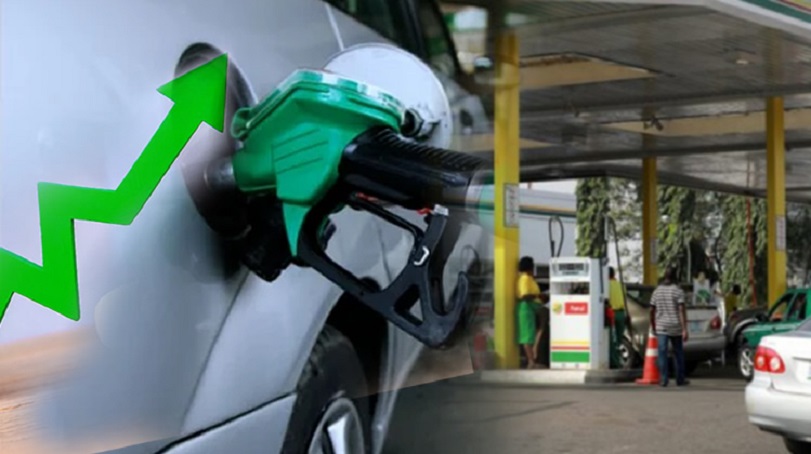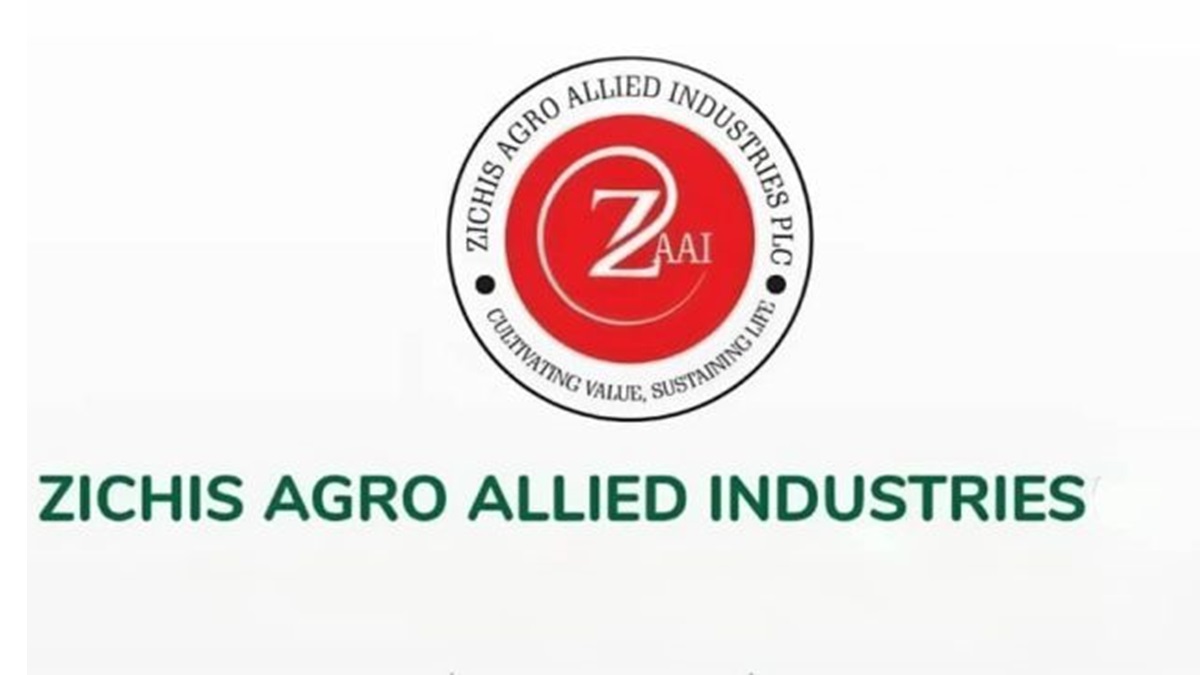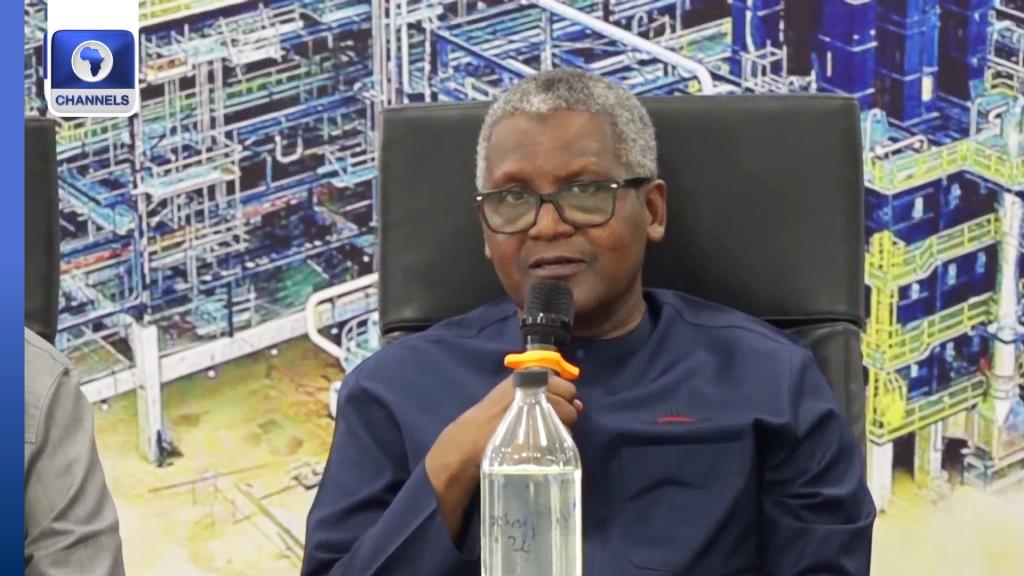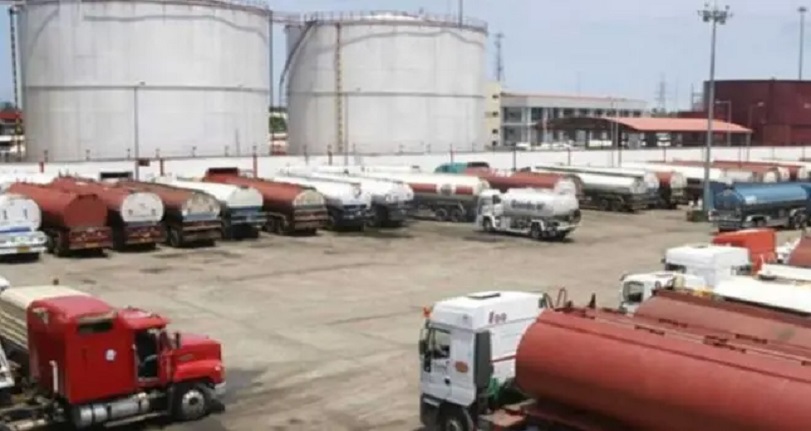Economy
Dangote Refinery to Reduce West Africa’s Petrol Imports—S&P

By Adedapo Adesanya
S&P Global Commodity Insights has projected that when the Dangote Refinery finally ramps up refining activities, it could massively reduce West Africa’s petrol imports from Europe by as much as 290,000 barrels per day.
This was disclosed during a panel discussion themed Exploring West Africa’s Oil Product Flows in a Changing Refining Landscape by S&P analysts, including Mr Joel Hanley, Mr Matthew Tracey-Cook, Ms Kelly Norways and Ms Elza Turner.
The panellists noted that the 650,000 barrels per day $19 billion facility in Lagos will before 2026, significantly change the fuels supply landscape in West Africa.
“Once we see the refinery ramp up, that could mean that West African gasoline imports or the import reliance that they have at the moment could drop by as much as 290,000 barrels per day between 2023 and 2026. So really, this could become quite a dominant supplier in the West African market, subject to when we start to see those barrels hit the market in Nigeria and the local region,” said Ms Norways, Downstream Sector Oil analyst at S&P.
Also, S&P said that Nigeria recently cut the maximum sulphur content for gas oil imports from 3,000 parts per million to below 500 parts per million, thereby significantly stifling the import of the product from Europe to Nigeria.
“Once Nigeria sees Dangote reach a steady state capacity, that could mean some 327,000 barrels per day of gasoline (petrol) supply and 244,000 barrels per day of diesel or gas oil. In practice, how that splits between the domestic market and the export market remains to be seen.
“There’s a significant amount of pressure from the Nigerian government for significant volumes of that supply to flow to the domestic market to try and solve this cost of living crisis and prevent significant pay-outs that need to be made onto importing those large volumes.
“But in reality, when we see that start to scale up is still subject to debate. Dangote has been espousing some pretty punchy timelines.”
Mr Hanley also said that the Dangote refinery may also reduce the cargo that often sits off the coast of West Africa.
“If you’ve ever been to Lagos, you see these enormous queues of refined products tankers waiting there. Now, one thing that I think people thought might relieve some of the pressure and, as I said, redress the imbalance somewhat would be the Dangote refinery.
“And it’s finally got going, not fully up to speed perhaps, but we started to see a cargo coming out, which is exciting,” stated the Director at S&P.
Mr Hanley also stated that while the ramp-up is important, it was also important for the firm to look at ‘where the money is.’
“As you said, there’s pressure from the Nigerian government because, of course, they would like this much-vaunted, long-awaited, Waiting for Godot kind of refinery to supply the local market and take some of the pressure off.
“But if the international markets are prepared to pay up for that product, then it’s going to be tricky. It’s a very tricky balance to decide where that flow will go,” Mr Hanley added.
Economy
Nigeria Investment Fund, Japan Unveil $50m Innovation Fund for Startups

By Adedapo Adesanya
The Nigeria Investment Authority (NSIA) and Japan International Cooperation Agency (JICA) have finalised agreements to launch a $50 Sovereignmillion impact innovation fund aimed at strengthening the Nigerian start-up ecosystem.
The fund is expected to provide patient capital to pre-seed, seed, and early-stage startups addressing critical social challenges in sectors such as agriculture, healthcare, education, energy, waste and water management.
JICA will provide $14 million in grant support, while NSIA contributes up to $20 million to match the grant.
Structured as an onshore public fund, the initiative combines financial support with technical assistance to help startups refine products, scale operations, and expand into new markets.
The fund is expected to create jobs, improve livelihoods, and contribute to sustainable economic development across Nigeria.
Speaking at the agreement signing ceremony between NSIA and JICA at the Ministry of Budget and Economic Planning, Mr Aminu Umar-Sadiq, the chief executive of NSIA, said: “The Fund represents a transformative step for Nigeria’s startup ecosystem. By providing early-stage ventures in high-impact sectors with the capital and support they need to grow, we are enabling innovators to tackle some of Nigeria’s most pressing challenges. Our collaboration with JICA underscores our commitment to entrepreneurship, inclusive growth, and sustainable development.”
Preparations are underway to operationalise the Fund and develop a pipeline of high-impact startups ready for investment. NSIA remains committed to advancing socio-economic development through strategic partnerships that scale impact, expand innovative solutions, and unlock access to capital.
On his part, the Japanese Ambassador to Nigeria, Mr Suzuki Hideo, said, “The Government of Japan hopes this new project will take root in Nigeria and bear fruit swiftly.”
Economy
Zichis, Japaul Gain Over 60% Each on Stock Exchange

By Dipo Olowookere
It was a windfall for shareholders of Zichis and Japaul on the Nigerian Exchange (NGX) Limited last week as the prices of the two stocks expanded by over 60 per cent each.
Business Post reports that on the part of Zichis, it chalked up 60.74 per cent to trade at N17.36, while Japaul appreciated by 60.16 per cent to N4.02.
Further, Infinity Trust Mortgage Bank expanded by 59.09 per cent to N15.75, Fortis Global Insurance rose by 53.85 per cent to 60 Kobo, and Jaiz Bank surged by 32.53 per cent to N11.00.
However, the losers’ group was led by RT Briscoe after it shed 20.78 per cent to close at N13.80, Mecure depleted by 18.99 per cent to N84.25, Tripple G slipped by 18.80 per cent to N5.40, Sovereign Trust Insurance moderated by 17.14 per cent to N2.32, and Ellah Lakes dropped 14.67 per cent to end at N12.80.
In the week, 71 equities appreciated, lower than 79 equities in the previous week, as 41 stocks depreciated versus 27 stocks in the preceding week, and 36 shares closed flat versus 42 shares of the previous week.
A look at the performance of the bourse showed that the All-Share Index (ASI) and the market capitalisation appreciated week-on-week by 6.95 per cent to 194,989.77 points and N125.164 trillion, respectively.
In the same vein, all other indices finished higher apart from the Growth index, which fell by 15.06 per cent, while the sovereign bond index closed flat.
As for the trading data, 7.662 billion shares worth N252.566 billion were exchanged in 345,118 deals, in contrast to the 4.652 billion shares valued at N193.326 billion traded in 286,751 deals a week earlier.
Financial stocks dominated the activity chart with 5.625 billion units sold for N113.599 billion in 129,729 deals, contributing 73.41 per cent and 44.98 per cent to the total trading volume and value apiece.
Services equities exchanged 493.131 million units worth N5.866 billion in 30,396 deals, and energy shares transacted 425.657 million units valued at N35.742 billion in 23,136 deals.
FCMB Group, Access Holdings, and Zenith Bank accounted for 3.594 billion shares worth N69.147 billion in 33,802 deals, contributing 46.90 per cent and 27.38 per cent to the total trading volume and value, respectively.
Economy
Seven Price Gainers Boost NASD OTC Bourse by 2.19%

By Adedapo Adesanya
Seven price gainers flipped recent declines at the NASD Over-the-Counter (OTC) Securities Exchange, raising the alternative stock market by 2.19 per cent on Friday.
According to data, the market capitalisation added N51.24 billion to end N2.389 trillion compared with the previous day’s N2.338 trillion, while the NASD Unlisted Security Index (NSI) climbed 85.65 points to close at 3,994.32 points, in contrast to the 3,908.67 points it ended a day earlier.
Business Post reports that the advancers were led by MRS Oil Plc, which improved its value by N13.00 to N200.00 per share from N187.00 per share, FrieslandCampina Wamco Nigeria Plc gained N7.40 to settle at N91.55 per unit versus the previous day’s N84.15 per unit, Central Securities Clearing System (CSCS) Plc appreciated by N6.08 to N71.00 per share from N64.92 per share, Afriland Properties Plc added 66 Kobo to finish at N17.17 per unit versus N16.51 per unit, IPWA Plc rose 37 Kobo to N4.15 per share from N3.78 per share, First Trust Mortgage Bank Plc grew by 11 Kobo to N1.20 per unit from N1.09 per unit, and Food Concepts Plc went up by 10obo to N3.70 per share from N3.60 per share.
On the flip side, there were two price losers led by Geo-Fluids Plc, which depreciated by 28 Kobo to N3.32 per unit from N3.60 per unit, and Industrial and General Insurance (IGI) Plc dropped 5 Kobo to sell at 45 Kobo per share from 50 Kobo per share.
Yesterday, the volume of trades went down by 92.0 per cent to 3.7 million units from 45.8 million units, the value of transactions fell by 59.4 per cent to N84.5 million from N208.2 million, while the number of deals went up by 7.7 per cent to 42 deals from 39 deals.
CSCS Plc remained the most traded stock by value (year-to-date) with 32.6 million units exchanged for N1.9 billion, trailed by Geo-Fluids Plc with 119.6 million units valued at N470.3 million, and Resourcery Plc with 1.05 billion units traded at N408.6 million.
Resourcery Plc closed the day as the most traded stock by volume (year-to-date) with 1.05 billion units sold for N408.7 million, followed by Geo-Fluids Plc with 119.6 million units worth N470.3 million, and CSCS Plc with 32.6 million units worth N1.9 billion.
-

 Feature/OPED6 years ago
Feature/OPED6 years agoDavos was Different this year
-
Travel/Tourism10 years ago
Lagos Seals Western Lodge Hotel In Ikorodu
-

 Showbiz3 years ago
Showbiz3 years agoEstranged Lover Releases Videos of Empress Njamah Bathing
-

 Banking8 years ago
Banking8 years agoSort Codes of GTBank Branches in Nigeria
-

 Economy3 years ago
Economy3 years agoSubsidy Removal: CNG at N130 Per Litre Cheaper Than Petrol—IPMAN
-

 Banking3 years ago
Banking3 years agoSort Codes of UBA Branches in Nigeria
-

 Banking3 years ago
Banking3 years agoFirst Bank Announces Planned Downtime
-

 Sports3 years ago
Sports3 years agoHighest Paid Nigerian Footballer – How Much Do Nigerian Footballers Earn


















